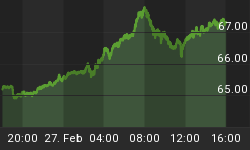The US stock market continues to power forward following the low reached in March. Momentum is gathering steam as investors are forced to participate, as analysts raise estimates, and as economists repeatedly say that the worst of the recession is behind us. However, so many problems still exist for the US Government, such as funding budget deficits, higher interest rates, inflation, and unemployment, that the probability of the problems associated with the unwinding of the largest credit bubble in history are behind the US is quite low.
The market's faith in the Federal Reserve to successfully set interest rates and monetary policy is shockingly strong despite over 20 years of reckless policy. The US stock market has been conditioned over this period to react positively to the loose monetary policy of the Federal Reserve. Yet each loose monetary event produced an even bigger problem for the economy. Of course, this negative feedback loop culminated in the housing bubble. So as if a crisis had never happened, the market is back at it again, with stock investors and economists believing that the fire has been put out and the economy is going to move forward. Unfortunately, the Federal Reserve is trapped because it owns so many risky assets.
Markets should have little faith in the Federal Reserve because it will be forced to either sacrifice the economy or the Dollar. With the Federal Reserve concerned about the strength of an economic recovery it will be reluctant to raise interest rates. Meanwhile, to prevent long-term interest rates from rising, which undermines the risky assets it now owns, the Federal Reserve is monetizing government debt which places tremendous pressure on the Dollar. From the Fed's standpoint going forward, the lesser of the two evils will likely be the further monetization of debt, resulting in inflation that the Federal Reserve will have no ability to stop. Perhaps the stock market is rising as a signal that hyperinflation has begun, but with gold below 1,000 and oil in the 70s, this seems unlikely. Instead, investors appear to be buying stocks for the economic recovery that is supposedly around the corner.
The markets are also ignoring that the US Dollar has fallen to new 2009 lows against many major currencies. Even the US Dollar index is at 2009 lows despite 57.6% and 13.6% weightings of the Euro and Yen, respectively. Investors continue to view Dollar weakness as a buy signal for US stocks given that Dollar strength was accompanied by falling shares prices in 2008. If the falling US Dollar trend continues, the next stage of the financial crisis will develop into a currency crisis; and when a country's currency is questioned, stock prices fall dramatically.
Investors are also willing to buy stocks despite the double whammy of unemployment levels last seen during the early 1980's recession and oil prices at all-time highs (if you exclude the only other time when oil was above $70 during the brief seventeen month period of June 2007-October 2008 when the global economy was roaring ahead). We question how it can be argued that the US economy is anything but in shambles with such high unemployment, high oil prices, decimated 401k's, and consumers more indebted than ever before. Economists and investors are looking for varying levels of strength in the economic recovery that is supposedly around the corner, but these issues all weigh heavily against any real economic recovery in the foreseeable future.
The stock market has had an impressive rally. The rally has been so large that it is now similar in magnitude to the 52% rally in the DJIA that was seen from the low in November 1930 to the bear market rally top in April 1930. However, after the rally ended in April 1930, the DJIA fell another 86% before bottoming in July 1932. If the Federal Reserve has printed enough money to "save the day" and avoid a 1930-1932 collapse, then the succeeding crisis must be a dramatic loss of the Dollar's purchasing power. A collapsing Dollar will not lead to investor optimism because the standard of living in the US will deteriorate, and with it, the consumer and business environment. Rather, economic strength and prosperity result from an environment in which savings are rewarded, not punished.
Optimism continues to rule the day in America as if we never even faced a crisis. Yet, the facts support being as pessimistic as ever as America faces many economic headwinds and the Government's funding and currency crises still lie ahead.















